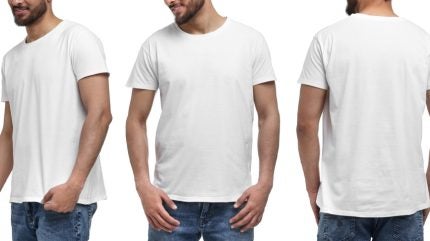
WRAP and LITAC describe the study as the first of its kind on tshirts and say it shows there is no correlation between price and durability.
The LITAC team tested the durability of 47 t-shirts (24 with male designs and 23 with female designs) from UK clothing brands, including luxury items.

Discover B2B Marketing That Performs
Combine business intelligence and editorial excellence to reach engaged professionals across 36 leading media platforms.
The testing included physical properties and washing using a standard mixed 30°C wash cycle followed by a tumble dry 50 times.
The t-shirts were graded for pilling (or bobbling – when small balls form on the surface of an item, which is the main reason people dispose of t-shirts), as well as colour fading, shrinkage and general appearance.
The study found that of the top ten best performing t-shirts, six cost less than £15 ($20.13), outperforming many more expensive t-shirts, including the most expensive costing £395.
WRAP’s programme lead on textiles Mark Sumner explains: “Most shoppers use price as an indicator of how hard-wearing clothes are ‘the more I spend, the more I’m bound to get out of my purchase’.

US Tariffs are shifting - will you react or anticipate?
Don’t let policy changes catch you off guard. Stay proactive with real-time data and expert analysis.
By GlobalData“But our study shows this is totally misleading. The most expensive t-shirt we tested cost £395 and ranked 28th out of 47, while a £4 t-shirt was placed 15th. The most durable t-shirt cost £28, but the one ranked second worst was £29! So, if you’re judging on price alone – buyer beware.”
LITAC’s Dr Eleanor Scott adds: “If circularity in fashion is to be truly effective, durability must come first. Durability underpins the reuse and resale market, as well as keeping our loved items in use longer. Crucially, these findings show that durability is not a luxury reserved for the few — it’s achievable at any price point.”
The research showed more of the hard-wearing t-shirts had a percentage of synthetic fibres in the composition including polyester, polyamide, and elastane. Cotton t-shirts tended to have higher shrinkage than synthetic ones, which can be exacerbated with tumble drying.
However, it also revealed well well-designed 100% cotton t-shirts can also be hard-wearing and good value for money as four of the 10 top garments were 100% cotton.
The study advises consumers to follow these three rules of thumb when purchasing a t-shirt:
- Heavier weight cotton t-shirts tend to perform better than lightweight ones
- T-shirts with a blend of cotton and synthetic fibres perform well
- Don’t rely on price to indicate how hard-wearing a t-shirt is.
The findings were presented by PhD student Kate Baker to the Product Lifetimes and the Environment (PLATE) Conference in Aalborg, Denmark and were developed as part of a clothing durability project through the UK Textiles Pact – WRAP’s ten-year industry initiative to bring greater circularity into the UK clothing market.
WRAP notes that by 2030, global apparel consumption is projected to rise by 63% to 102m tonnes. In the UK, 711,000 tonnes of textile waste were sent to landfill or incineration in 2021, with 72% through the kerbside residual waste stream.
WRAP believes designing for durability is critical to moving the industry to a more sustainable model and can be done while still offering value for money for consumers.
The NGO adds the average person buys around 28 new items of clothing every year, which is typically 8Kg each, or 586,000 tonnes in total and typically one quarter of every UK wardrobe is unworn for more than a year.
WRAP explains its testing methodology for durability is ready to be adapted for other regions.
It is exploring partnerships with EU and US brands to co-create durability and performance standards tailored to their national needs.





